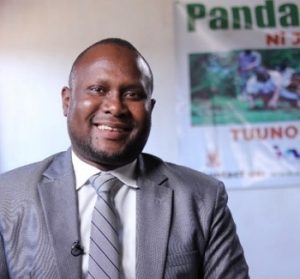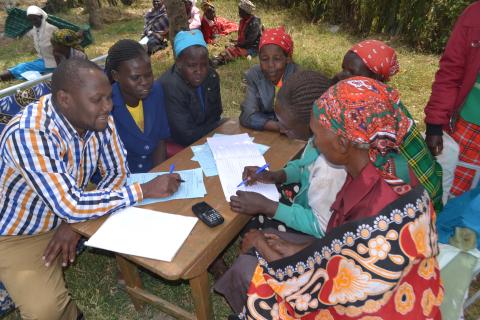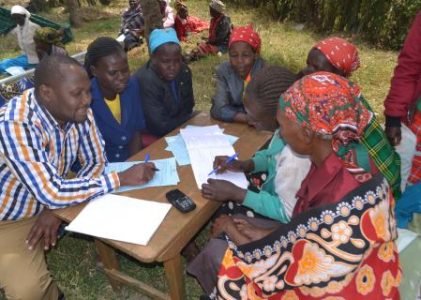
From a distance the development sector looks well. Get interested. Establish a local community organization and try your luck in the “do good” sector. Write proposals. Get regrets, rejections and finally get picked. Meet all the due diligence requirements. Sign the contract. Get a few dollars. Start implementing. Write reports. Monitor. Audit. Evaluate. Write reports. Repeat.
Now, you are at the tail end of the international aid system with little influence or power on how development happens. You must toe the line, adhere to written and unwritten scripts and deliver the international development franchise to communities. If you question, there are more than 10,000 plus struggling organizations ready to take your work.
You soon realize that you have been elevated to a powerless grant seeker, applying for illusive foreign funding and searching for colonial reassurances of dry aid. If you continue, the circus goes on. It seems exhausting, wasteful and unsustainable for local community-led organizations to survive in this arrangement.
Indeed, the current funding models are on the run. You hardly get grants for more than two years. The funding ends abruptly. Without shame, the same donor comes with another disconnected short-term project. New terminologies get crafted to cover the old mistakes. The search for the magical donor bullets gets intoxicating.
Former World Bank economist William Easterly sums it up:
“Aid is the modern incarnation of the white man’s burden mentality of colonial times. This top-down approach has mostly been a disaster. It’s uncoordinated and unaccountable…It promotes western values and institutions that often can’t be externally imposed. It ignores past failures and embraces more of the same.”
Since the 2016 Grand Bargain, little has changed to get more means into the hands of people in need and to improve the effectiveness and efficiency of the humanitarian action.
“Despite manifest failures and repeated criticisms, the machinery of international development remains substantially unchanged. It’s time for a radical overhaul,” says Barry Knight, Secretary to Centris Trustees.
The structures of current development delivery are pathologically ill.
“The current aid system has structural flaws. It has not led to development for decades. To change this system you need critical friends,” says Dr. Moses Isooba, Executive Director, Uganda National NGO Forum.
Let’s change this.
Experiences from Kenya
There are 11,624 registered non profits in Kenya, 24.22% are active, and 0.9% control 99% of foreign aid.
According to the NGOs bureau, as of 2020, there were 11,624 registered national and international non-profits in Kenya. Of these, 9,255 organizations were considered active during the financial year 2019/2020. This figure excludes thousands of community-based organizations, societies, trusts and foundations with are registered under other jurisdictions. Who controls donor funds in Kenya?

In Kenya, INGOs and national NGOs control donor funds. The list of international and national receivers of foreign aid reads like an exclusive club of the chosen few. Clearly, donor support to local community organizations was negligible and remained unreported.
In 2019/20 these organizations were direct implementers of KES158.7 billion of donor aid. The first leading 50 INGOs control KES 73.8 billion, while the first 50 national NGOs control KES 20.7 billion. If we move the slide to the first 100 in each category, it becomes clear that Kenya’s NGO sector is controlled by 1.8% foreign and national entities. The majority, 98.2% of NGOs in regions, counties and communities are often in survival mode, depending on sporadic grants.
During the COVID-19 pandemic, less than 0.09% of donor funds went to community organizations, yet many of these organizations were at the frontlines in responding to the crisis. The majority of INGOs held billions of unspent with COVID-19 funds, two years after the pandemic. This denied citizens resources when they needed them most.
Elsewhere in Ukraine, the story is the same:
“In spite of the fact that the international humanitarian sector has raised many millions of dollars, we have failed to see resources coming our way. In May, the UN Financial Tracking Service (FTS) showed that UN agencies received about two-thirds of humanitarian aid funding to Ukraine. International NGOs received 6% of the funding, while national Ukrainian NGOs received a scant 0.003% of the total amount.”
This is contrary to global development and philanthropy commitments to decolonize donor aid. The talk of Kenyan-led, Kenyan-owned, and Kenyan-managed development programming remains a pipe dream.
A 2021 report commissioned by the Vodafone Foundation revealed that INGOs were playing an active role in killing local organizations to preserve their power structures and influence. The report established that many INGOs were opening up in-country offices deep into villages and communities. Rather than generating greater local empowerment and funding distribution, the funder’s head office would distribute to their in-country office, severely limiting the opportunities for long-standing organizations to attract the funder’s support. Moreover, the newly established in-country offices often poached talented personnel from local organizations that could not match their salaries or benefits.
INGOs are risk averse and they are currently doing almost everything in Africa villages, as if there are no local organizations in those areas. Their superiority complex disconnects them from appreciating the value of local organizations, whom they often treat with fear, contempt and suspicion. They have perfected the narrative that local organizations have little capacity to deliver aid. Because of this, they now have a false basis to distribute basic things like cooking stoves, solar lanterns, jerricans, mosquito nets, farm inputs, food rations, water and sanitary kits – among others items – to villages. This is wrong.
The September 2022 edition of Alliance Magazine, Decolonizing Philanthropy, affirms that a call to decolonize philanthropy has become an animating force in progressive philanthropy circles:
“Like many terms which crystallize an idea and capture the imagination, it carries both broad and specific meanings. Broadly, it reflects a view that philanthropy has been complicit in economic, social, political and cultural systems of exploitation which need to be uprooted.”
Alliance advises that decolonizing philanthropy should lead to interrogating sources of philanthropic wealth, ending extractive investment practices, making reparations, diversifying boards, and building more participatory, equity-centred and trust-based philanthropy, all of which shifts power from the wealthy to the poor and from funder to grantee.
Bond’s 2022 Power in Development: Building an Equitable System conference showcased practical steps INGOs, donors and governments should take to move towards a devolved and decolonized development system. This event demonstrated that it is possible to transform our systems, and to rethink our roles, practice and purpose.
We agree aid decolonization is a complex process. It should be seen as a radical demonstration of love, not an act of witch-hunt and finger pointing.
So how can you lift community-led organizations in a failed aid system?
Community organizations that are at the frontlines of development delivery are often excluded in current funding models. Here are some suggestions on how we can lift them to the frontline of the development sector:
- Build solidarity, speak out and report. There are missed opportunities in keeping silent and disorganized. Local organizations should enhance their solidarity and establish active platforms to speak out about unfavourable funding models. Question the status quo and create awareness to change the mind-set on failures of current development delivery. There is a need to establish local community-led movements to question the skewed funding and shift the power to communities. We need to tell positive narratives about the good work of community organizations. This includes strengthening philanthropy networks around the world.
- Lobby for systems change. Influence international aid to recognize, respect and build on local resources and assets, rather than overlook, undermine, or displace them. Petition foreign missions in Kenya to change their country support strategies to recognize the value and urgency of supporting local organizations to decolonize aid. This means the funding agencies must look at their internal governance models and refocus their models to suit the needs of the communities. This calls for a relook of power and change, a deeper understanding of how wealth is accumulated and an acknowledgement of how colonial systems and mind-sets continue to thrive in both implicit and explicit ways.
- Empower, adopt local organizations. We need to look beyond the colonial templates of onboarding new local non-profits to the systems. To minimize these risks, large non-profits should adopt local organizations and provide them with unrestricted resources to achieve potential. The risks associated in this model must be well thought through to avoid creating replicas of INGOs in communities. Accelerate the urge to find innovative ways to increase local resources from communities, the corporate sector and individuals.
- Fund direct, fund unrestricted, fund without fear. To minimize the bureaucracies in the international aid systems, there is a need for funders to use their intelligence and technologies to find and fund local organizations directly. This is a model that can be tried. We should increase unrestricted funding to support leadership development, governance and operations of resource-constrained local non-profits.
- Reimagining INGOs. There is a need for INGOs to stop direct implementation of INGOs in communities. This has killed local organizations who can’t compete with well-connected INGOs. There is need to change laws so that INGOs operate from one national office and engage local community-led organizations in the implementation of their programmes.
- Reimagining local community organizations in the Global South. Let’s change the narrative of how local development actors are perceived and treated by international funders. Local organizations should be resilient and purposed to enhance their value, capacities and credibility on corporate governance, programme delivery, finance, digital transformation and sustainability. This should go further and help communities to look at their internal capacities and move away from being the subjects of capacity definitions by international aid. Document community assets such as local knowledge, networks, trust, skills and expertise which are often ignored and undocumented in the current aid models. These resources should be factored in when building partnerships and collaborations.
- Invest in self-care for leaders and champions of local non-profits. With dwindling aid, non-profit leaders and their staff are often ignored. The majority of funding support puts a ceiling of 10-15% on staff salaries and welfare. With this reduced support, many of these changemakers experience burnouts as result of their commitments to grow their organization. Since funding circles for many non-profits are tied to two to three year cycles, there is a high turnover of skilled staff. There is a need for international aid to offer unrestricted support to these local community organizations to implement their pressing needs. In addition, similar support should be provided to the leaders of local non-profits.
Conclusion
Let’s move with speed and walk the talk on decolonizing philanthropy and lifting local community-led organizations. It is important to embrace community-driven development that gives premium value to local assets, knowledge, trust and networks. Lets get uncomfortable, unique and take risks to fund directly to community organizations. The old-exclusion mechanism being based on donor-focused capacities and due diligences must be deflated.
I echo the words of Shonali Banerjee, senior research associate, Centre for Strategic Philanthropy at Judge Business School, University of Cambridge and Urvi Shriram, Centre of Philanthropy for Social Justice at the Indian School of Development Management:
“Given the inherent power asymmetry between the funders and ‘beneficiaries’, decolonized philanthropy must focus on breaking the perennially reinforced cycles of hierarchical oppression.”
Let us promote the #ShiftThePower movement that seeks more equal funding relationships, and encourages a transfer of power from development organizations to local people so that they can build assets, capacities and trust. Create awareness and strengthen the #ShiftThePower movement to change ourselves as funders and receivers of development aid.
“Change ourselves. We need both humility and boldness, and to be ready to challenge our own power and to listen to and work with others,” #ShiftThePower Manifesto for Change.
Elizaphan Ogechi, Executive Director, Nguzo Africa Community Foundation & a #ShiftThePower Fellow
